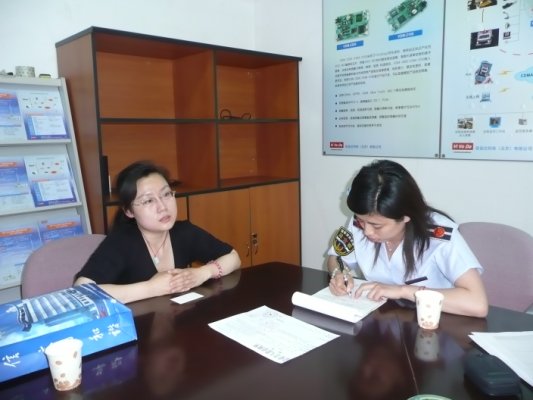Top graduate finds calling as community worker
- By Li Huiru
 0 Comment(s)
0 Comment(s) Print
Print E-mail China.org.cn, July 19, 2012
E-mail China.org.cn, July 19, 2012
While in college, Guo Ling made up her mind about what she would do after graduation. As an international relations majoring postgraduate student at Beijing Normal University, one of China's elite universities, Guo Ling planned to make her mark as a diplomat or a researcher of international relations. However, when she was graduated, it happened that she passed the Civil Service Examinations and was offered a position in a community in Beijing. She was hesitant upon hearing the news. After all, as a famous university postgraduate student, she didn't expect to take such basic job.
|
|
|
Guo Ling (R) explains the related policies to a community complainant. [By Li Huiru/China.org.cn] |
"It was really a tough decision," Guo recalled. "Though my impressions about the community officers were not bad, it's just I held this stereotype in my mind and thought they [community officers] are a group of middle-aged women who talk about family gossip all day long. I was a fresh graduate and I don't want to do work unworthy of my talents."
"In addition, I was born at a small coastal village in Shandong. My parents were very proud of me when I was admitted to the BNU. Villagers said I would make a big fortune upon graduation. If they knew I ended up working in a community, how would they think about me? Just thinking about this makes me upset."
But in those days the competition in Beijing's job market was extremely fierce. After several sleepless nights, she decided to take the job.
"Though it wasn't the ideal work I had dreamt of, it was a fair job. Besides, I do love Beijing and this job can help me settle down," she said.
Since she has academic background in legal knowledge, she was assigned to a department that has major function in solving labor disputes. Most of her complainants are in regards to migrant workers. They speak with all kinds of thick accents. And almost eight in ten cases, their moods are very unstable.
"I remember quite clearly the first time when I faced the complainants on my own," she recalled. "It was a very hot August afternoon. A lean and swarthy construction worker rushed in with his eyes tumescent and a bloody nose. He looked a mess. Although I can even recite Labor Contract Law backwards fluently, and I had really psyched myself up for this, I was rather taken aback when he came into my office."
"Never before have I faced with such tense moments," she said. "I was really psyched out then. I tried to understand the grievance of that worker. But he was furious and wouldn't listen to what I was asking. I found him impossible to get through to."
When Guo was at her wits' end about the whole thing, one of her colleagues came and helped her. The colleague invited the worker to sit down and poured a cup of water for him. After the man calmed down, he discussed his grievances with her colleague. Awakened to her limitations, Guo began to take her responsibilities seriously.
"My view towards this job has taken a 180 since this incident," Guo said. "In addition to a sound legal background, this job also needs good communication skills and strong aptitude for problem solving. I may have more credentials than that colleague of mine in terms of legal knowledge, but definitely less experience in dealing with all kinds of people."
Five years have passed since she took the job. She now mixes well with the community resident population. Each day, people with grievances turn to her for help. Some of them came to complain about their boss deducting or delaying their salary. Some of them were fired without proper compensation. She no longer considers small talk or her job degrading.
"I feel fulfilled in helping these helpless people sort things out," she said. "From these unsophisticated faces I sensed my sacred mission. The seemingly trifle things and talk can help build a harmonious society. The things and topics that the ordinary people care about most are larger than life to our community officials. "







Go to Forum >>0 Comment(s)